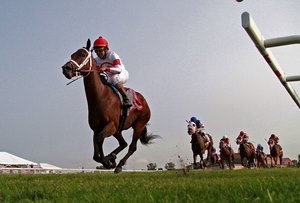Kentucky Downs Reports Record Handle for Six-Day Meet


Although fans were not permitted to attend the Kentucky Downs six-day meet due to COVID-19 restrictions, the Franklin, Ky., track smashed betting records with wagering of more than $59.8 million on 62 races, including almost $9.5 million on its closing-day card Sept. 17. The previous record was last year's $41.2 million for 50 races over five days.
The track faced less competition from major tracks in the simulcast marketplace this year.
Purses paid out to horse owners totaled a record of nearly $12.4 million, topping last year's total of $11.5 million paid out over five days. Even with an 11% daily reduction from 2019, purses averaged over $2 million a day.
The track attributed the daily purse reduction as caused by a two-month shutdown of the track's Historical Horse Racing gaming facility. The slot-like HHR devices supplement race purses.
"It's a great setup," California-based trainer Doug O'Neill said in a news release from Kentucky Downs. "Purses are insane. They take care of you. I'd love to see them add a few days to this meet."
The large purses and a scheduled pause in racing in New York and California contributed to a star-studded jockey colony. Many of the top riders in the country participated.
Tyler Gaffalione added his first Kentucky Downs riding title to his 2020 meet crowns at Keeneland and Churchill Downs, winning 11 races, including three stakes.

Mike Maker won a record fifth training title with eight victories, and his client Three Diamonds Farm earned its first owner's title at the track with four wins.
Four-time defending Eclipse Award-winning trainer Chad Brown's deep stable was a regular presence at the meet for the first time. His three wins included Flavius in the Tourist Mile Stakes and Regal Glory in the Kentucky Downs Ladies Turf Stakes (G3T). Brown previously had raced only one horse at Kentucky Downs.
Donegal Racing's Arklow, with Florent Geroux riding for trainer Brad Cox, came away with the meet's richest race, the Calumet Farm Kentucky Turf Cup (G3T), for the second time in three years. The Maker-trained Zulu Alpha, last year's winner, finished third.
Both horses could pursue the Longines Breeders' Cup Turf (G1T) Nov. 7 at Keeneland.
Breeze Easy's Imprimis, trained by Joe Orseno, earned a fees-paid spot in the Breeders' Cup Turf Sprint (G1T) Nov. 7 at Keeneland by virtue of winning the Runhappy Turf Sprint Stakes (G3T), a Breeders' Cup "Win and You're In" Challenge Series race.
Field sizes, for which Kentucky Downs has led America for the past few years, averaged 10 runners per race, down from last year's lofty average of 11.3. The better races this meet drew well, with the 16 stakes races averaging 10.3 starters.
"We can't thank the horsemen and the horseplayers enough for their support this meet," said Ted Nicholson, Kentucky Downs' senior vice president and general manager. "The numbers speak for themselves. We appreciate the Kentucky Horse Racing Commission giving us an additional day this year, and the horsemen took full advantage of it."
The meet featured an unusual twist: Michael Wrona and Larry Collmus, two of the most respected race-callers in the world, shared the mic on opening day, with Wrona calling the next two cards and Collmus the remainder of the short season.
Also during the meet, Kentucky Downs for the first time utilized Equibase Gmax timing and tracking based on GPS technology—a timing system that came under critique this summer at Del Mar. Previously, all of Kentucky Downs' races were hand-timed.
Because the new system had some different and more standard starting positions based on GPS measurements, race times varied significantly and generally were faster from past meets, according to Kentucky Downs.
While the hand-timing continued from the new starting positions as part of Kentucky Downs' testing, the technology-generated times were the official times for Equibase charts.
The meet also had its share of frustrations for horsemen and bettors. One race was declared a no-contest after the gate was sprung before two horses entered it, which the track attributed to faulty batteries, and another day a substitute tractor needed to be called into action to move the starting gate in a two-turn route race. Later over the six-day season, a race was delayed over 30 minutes from a television production trailer power failure, and the incorrect order of finish was initially presented after a race on Wednesday and then caught by officials before it was declared official.
"We had some mishaps and glitches, and each will be scrutinized whether they resulted from human error or were beyond our control," Nicholson said. "Through it all, our racing was spectacular, which is a credit to our owners, trainers, and jockeys and to which bettors across the country enthusiastically responded.
"As far as times and course records, we are going to study the data before making a final determination. But in all likelihood, 2020 will become the baseline year going forward as far as course records. With any new technology, there is a learning curve and hiccups. But we believe the new system is a big step toward addressing the challenges of timing such a unique course as Kentucky Downs."
